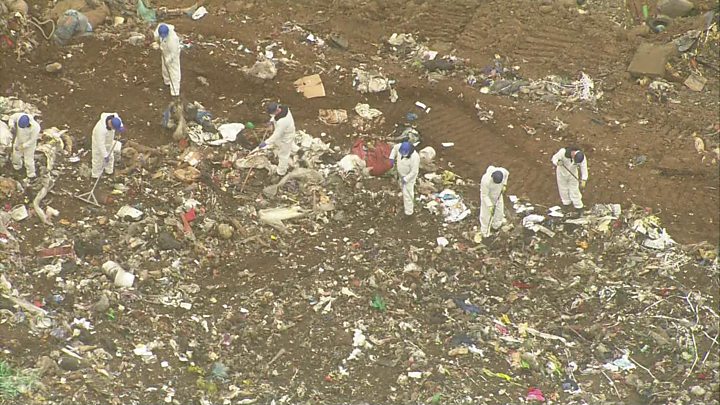A new image showing bomber Salman Abedi on the day he attacked Manchester Arena has been released by police.
Officers are appealing for people who might have seen him carrying the blue suitcase between 18 and 22 May.
The BBC has also obtained CCTV footage which appears to show Abedi in a shop the day before the bombing, which killed 22 people.
Police are searching a landfill site on the outskirts of Bury, Greater Manchester.
The 22-year-old visited the Wilmslow Road area of Manchester and the city centre with the suitcase, police said.
Det Ch Supt Russ Jackson, from the North West Counter Terrorism Unit, said: "I want to stress that this is a different item than the one he used in the attack.
"We have no reason to believe the case and its contents contain anything dangerous, but would ask people to be cautious."
He added: "The public should not approach the case if they see it but contact police immediately on 999."
Manchester attack: Who were the victims?What we know about bomber Salman AbediSpecial report: Manchester bombingNew CCTV footage has also emerged which appears to show Abedi shopping at a convenience store.
The footage was recorded in a store close to the flat where the suicide bomber was just hours before the attack.

Media captionCCTV footage appears to show the Manchester bomber walking around a shop
The BBC has passed the footage to investigating officers.
Greater Manchester Police have asked anyone with information to contact the Anti-Terrorist Hotline in confidence on 0800 789 321.

Media captionAerials of anti-terror search at a landfill site near Bury
Officers have been searching a landfill site in Pilsworth near Bury.
Footage of the search shows investigators in white boiler suits and blue helmets raking through the debris near a large red tent.
Earlier, there were searches in Whalley Range, Manchester and in Chester and Shoreham-by-Sea, West Sussex, where a 23-year-old man was arrested on suspicion of terrorism offences.
Officers are also currently searching an address in the Rusholme area of Manchester.
In all, 14 men are now being questioned in connection with the investigation into the attack.
Meanwhile, Manchester City Council has announced there will be a vigil in St Ann's Square on Monday just after 22:30 BST - exactly one week after the attack took place.
Manchester Victoria station will also
reopen on Tuesday, British Transport Police have said.
The station, which is connected to Manchester Arena where the bomb went off, suffered structural damage in the incident.
NHS England said 52 people injured in the attack were still being treated in hospital - including 19 in critical care.Image captionFlowers and tributes lined St Ann's Square in Manchester on Monday
Abedi detonated a bomb on 22 May at the end of a concert by US singer Ariana Grande.
MI5 said it would hold an inquiry into the way it dealt with warningsfrom the public that he was a potential threat.
The security service, which was alerted to his extremist views three times prior to last Monday's attack, will examine how it dealt with the warnings.
Home Secretary Amber Rudd said it was right for MI5 to review its processes.
MI5 has launched a "post incident investigation" into how the Manchester bomber was overlooked, while a separate report is being prepared for ministers and those who oversee the work of the service.
A Whitehall official said previously that Abedi was one of a "pool" of former subjects of interest whose risk remained "subject to review" by the security service and its partners.
BBC Newsnight reported that at 16, Abedi - born in Manchester to Libyan parents - fought against the Colonel Gaddafi regime with his father during the school holidays.
It was while at Manchester College that two people who knew Abedi have confirmed they made separate calls to an anti-terrorism hotline to warn the police about his extremist views.



